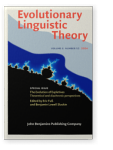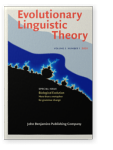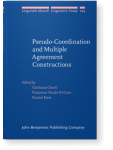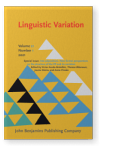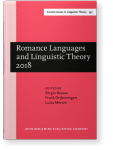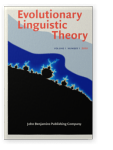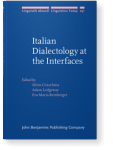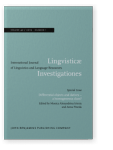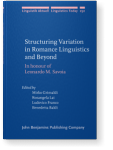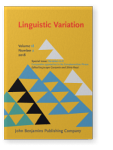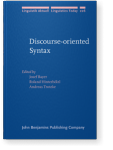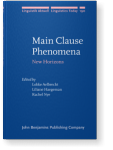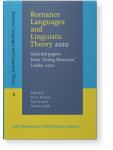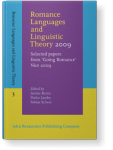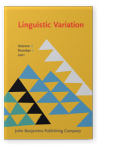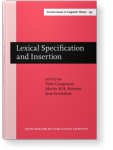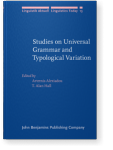Maria Rita Manzini
List of John Benjamins publications for which Maria Rita Manzini plays a role.
Journal
Title
Biological Evolution: More than a metaphor for grammar change
Edited by Maria Rita Manzini
Special issue of Evolutionary Linguistic Theory 3:1 (2021) v, 121 pp.
Subjects Cognition and language | Evolution of language | Historical linguistics | Language acquisition | Neurolinguistics | Psycholinguistics
2022 Chapter 3. A bisentential syntax for a /bare finite complements in South Italian varieties: Motion verbs and the progressive Pseudo-Coordination and Multiple Agreement Constructions, Giusti, Giuliana, Vincenzo Nicolò Di Caro and Daniel Ross (eds.), pp. 65–98 | Chapter
In South Italian varieties of Apulia, Calabria and Sicily a restricted number of control/raising verbs, including stay/be, go, come and want embed finite complements, either bare or introduced by a. These are not necessarily languages with so-called subjunctive particles; in any event, the… read more
2021 Locative Ps as general relators: Location, direction, DOM in Romance Into adpositions: New formal perspectives on the structure of the PP and its variation, Acedo-Matellán, Víctor, Theresa Biberauer, Jaume Mateu and Anna Pineda (eds.), pp. 135–173 | Article
Based mostly on the Romance languages, we provide evidence for the conclusion that oblique adpositions involved in the encoding of location and direction do not contribute a specific, fixed spatial meaning. On the contrary, they are general relators, relating a complement to an event by… read more
2021 Introduction: Language evolution: Beyond the metaphor Biological Evolution: More than a metaphor for grammar change, Manzini, Maria Rita (ed.), pp. 1–5 | Introduction
2021 Chapter 8. - ŋ plurals in North Lombard varieties: Differential plural marking and phases Romance Languages and Linguistic Theory 2018: Selected papers from 'Going Romance' 32, Utrecht, Drijkoningen, Frank, Sergio Baauw and Luisa Meroni (eds.), pp. 151–170 | Chapter
We focus on North Lombard -a and -n feminine plurals, for which we provide a morphological analysis. At the syntactic level, the relevant varieties are characterized by the phenomenon of Differential Plural Marking, whereby phasal domains have different realizations of plural morphology on the… read more
2019 Parameters and the design of the Language Faculty: Northern Italian partial null subjects Evolutionary Linguistic Theory 1:1, pp. 24–56 | Article
Following Berwick and Chomsky (2011), parameters are degrees of freedom open at the externalization (EXT) of syntactico-semantic structures (SEM) by sensorimotor systems (PHON) (Section 1). Within this framework, in Section 2 I focus on a case study concerning Northern Italian subject clitics,… read more
2019 N morphology and its interpretation: Romance feminine singular/plural -a Italian Dialectology at the Interfaces, Cruschina, Silvio, Adam Ledgeway and Eva-Maria Remberger (eds.), pp. 257–293 | Chapter
This contribution deals with the -a inflection in Italian varieties, which realizes plural as well as feminine singular. Thus the -a inflection externalizes apparently irreducible contents (singular/plural). We try to answer the question whether it is possible to unify these two readings. Feminine… read more
2019 ‘ Agreement of structural obliques’ parameter: dom and pseudopartitives Differential objects and datives – a homogeneous class?, Irimia, Monica Alexandrina and Anna Pineda (eds.), pp. 82–101 | Article
We consider two sets of facts. The first is that dom objects may or may not agree with perfect participles in Indo-Aryan. The second is that (pseudo)partitive subjects may agree with the verb in the plural or not. We account for the dom parameter, basing on the assumption that dom corresponds to… read more
2018 Chapter 7. Micro‑ and macro-variation: From pronominal allomorphies to the category of irreality/non-veridicality Structuring Variation in Romance Linguistics and Beyond: In honour of Leonardo M. Savoia, Grimaldi, Mirko, Rosangela Lai, Ludovico Franco and Benedetta Baldi (eds.), pp. 111–120 | Chapter
Manzini and Savoia (2005, 2017) argue that morphophonology is involved in enclisis/proclisis alternations only in so far as it externalizes the syntactico-semantic category of non-veridicality, as outlined here in Section 1. In Section 2 we review typological literature reporting that the irrealis… read more
2018 Chapter 1. Introduction: Structuring thought, externalizing structure: Variation and universals Structuring Variation in Romance Linguistics and Beyond: In honour of Leonardo M. Savoia, Grimaldi, Mirko, Rosangela Lai, Ludovico Franco and Benedetta Baldi (eds.), pp. 1–28 | Chapter
The articles collected in this volume bear witness to the important role played by studies on language variation, specifically on Romance microvariation, in the development of formal approaches to language. Leonardo M. Savoia is a central figure in this endeavor, in the twin fields of phonology and… read more
2018 Finite and non-finite complementation, particles and control in Aromanian, compared to other Romance varieties and Albanian Variation in C: Comparative approaches to the Complementizer Phrase, Garzonio, Jacopo and Silvia Rossi (eds.), pp. 215–264 | Article
Our Aromanian data come from Diviakë, Libofshë and Fier, three locations close to one another in southern Albania, and from Këllez, also in southern Albania. We argue that the impossibility of embedding sentences directly under V-v (Agree Resistance Theorem) leads to the overall shape of… read more
2015 Italian adverbs and discourse particles: Between recategorization and ambiguity Discourse-oriented Syntax, Bayer, Josef, Roland Hinterhölzl and Andreas Trotzke (eds.), pp. 93–120 | Article
In Italian and its dialects, there is no evidence that lexical items functioning as discourse particle correspond to specialized functional heads, or that they have a truncated internal structure, making them into weak categories. Rather they have the syntactic distribution of adverbs, with which… read more
2012 The status of complementizers in the left periphery Main Clause Phenomena: New Horizons, Aelbrecht, Lobke, Liliane Haegeman and Rachel Nye (eds.), pp. 297–318 | Article
In Section 1 we argue that the nominal nature of complementizers in many languages (notably wh-items in Romance) points to the conclusion that this extra embedding layer is nominal (cf. Rosenbaum 1967). In Section 2 we address the question whether the structures they create are more similar to… read more
2012 From Romance clitics to case: Split accusativity and the person case constraint Romance Languages and Linguistic Theory 2010: Selected papers from 'Going Romance' Leiden 2010, Franco, Irene, Sara Lusini and Andrés Saab (eds.), pp. 1–20 | Article
We reconstruct the notion of dative in terms of a Q(⊆) category, denoting an ‘inclusion’ relation – to be understood roughly as ‘possession’. In the light of this, we reconsider interactions between dative and 1st/2nd person in Romance. In Italian 3rd person clitics have two separate… read more
2011 (Definite) denotation and case in Romance: History and variation Romance Languages and Linguistic Theory 2009: Selected papers from 'Going Romance' Nice 2009, Berns, Janine, Haike Jacobs and Tobias Scheer (eds.), pp. 149–166 | Article
Recent minimalist approaches have reduced case to independent primitives (agreement, Tense) – but without any connection to its morphological expression. To solve this dichotomy, we consider the Latin -s case ending. Rejecting default treatments, we conclude that -s is associated with denotational,… read more
2011 Reducing ‘case’ to denotational primitives: Nominal inflections in Albanian Linguistic Variation 11:1, pp. 76–120 | Article
The nominal inflection system of Albanian includes specifications of case, definiteness, number and nominal class (gender). Our analysis recognizes three types of properties as theoretically relevant, namely N(ominal class), Q(quantification), D(efiniteness). Q inflections are responsible for the… read more
2000 Sentential Complementation: The Subjunctive Lexical Specification and Insertion, Coopmans, Peter, Martin B.H. Everaert and Jane Grimshaw (eds.), pp. 241–268 | Article
1997 Syntactic Dependencies and their properties: weak islands Studies on Universal Grammar and Typological Variation, Alexiadou, Artemis and Tracy Alan Hall (eds.), pp. 135–153 | Article
